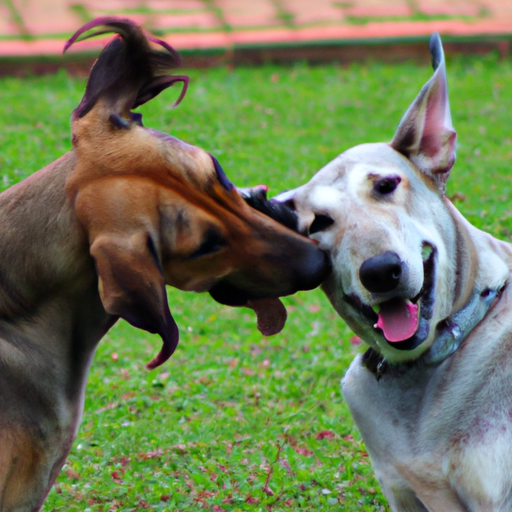As a passionate dog owner, you’ve probably noticed something peculiar in your furry friend’s behavior – they sometimes nibble on other dogs. You might wonder, “Why do dogs nibble on other dogs?” It’s a question that many dog owners ask, and it’s not always clear why this behavior occurs. This article aims to shed light on this question and delve into the fascinating world of canine behavior.
Table of Contents
- Understanding Dog Behavior
- Reasons Why Dogs Nibble on Other Dogs
- Is Nibbling a Cause for Concern?
- How to Respond to Your Dog’s Nibbling
- Frequently Asked Questions
Key Takeaways:
– Dogs nibble on other dogs as a form of social interaction.
– Nibbling can also be a sign of affection, playfulness, or a way to relieve itchiness.
– It is usually not a cause for concern unless it becomes excessive or aggressive.
– It’s essential to monitor your dog’s behavior and intervene when necessary, for their safety and the safety of other dogs.
Understanding Dog Behavior
Dogs, like humans, have a variety of ways to communicate and interact with one another. Nibbling is one such method. It’s a behavior that we often see in puppies, but adult dogs can engage in it too. Dogs use their mouths much as humans use their hands – to explore, to play, and to show affection (source).
It’s essential to understand the context in which your dog is nibbling. Are they doing it when they’re playing? Or is it when they’re relaxing with another dog? The context can provide clues to what your dog is trying to communicate. For more insights into understanding dog behavior, check out this article on Onetopdog.com.
Reasons Why Dogs Nibble on Other Dogs
1. Social Interaction
Dogs often nibble on other dogs as part of their social interaction. It’s a way for them to bond and build relationships with other dogs. This behavior is especially common in puppies as they learn how to communicate effectively with their peers.
2. Affection
Nibbling can also be a sign of affection. Dogs will often nibble on the ears, neck, and other areas of another dog as a way to show their love and care. It’s similar to how humans might hug or kiss to show affection.
3. Playfulness
Many dogs will nibble during play sessions. It’s their way of engaging in a fun activity and bonding with their furry friends.
4. Itch Relief
Sometimes, dogs will nibble on each other to help relieve an itch. They’ll target those hard-to-reach areas like the back or behind the ears. If you notice your dog frequently nibbling in these areas on another dog, it might be a sign of a skin condition or parasites, and a visit to the vet might be in order. For more information on common skin conditions in dogs, visit this page.
Is Nibbling a Cause for Concern?
In most cases, dogs nibbling on other dogs is not a cause for concern. It’s a normal part of their social behavior. However, if the nibbling becomes excessive, aggressive, or causes distress to the other dog, it might be a problem. It’s important to monitor your dog’s behavior and intervene when necessary.
For tips on how to handle aggressive dog behavior, take a look at this helpful guide on Onetopdog.com.
How to Respond to Your Dog’s Nibbling
If your dog’s nibbling is causing problems, there are steps you can take to address the issue.
-
Monitor their behavior: Keep a close eye on your dog when they’re interacting with other dogs. Look for signs of distress in the other dog, or signs that your dog’s nibbling is becoming aggressive.
-
Intervene when necessary: If your dog’s nibbling is causing distress or harm, it’s essential to intervene. Separate the dogs and give them time to calm down.
-
Consult a professional: If the nibbling becomes a persistent problem, it might be time to consult a professional dog trainer or behaviorist. They can provide you with strategies to manage your dog’s behavior effectively.
Frequently Asked Questions
Q: Is dog nibbling a sign of dominance?
A: Not necessarily. While some might interpret nibbling as a sign of dominance, it’s usually more about social interaction, playfulness, or affection. However, if the nibbling becomes aggressive or causes distress to the other dog, it could be a problem.
Q: What if my dog’s nibbling is causing harm to the other dog?
A: If your dog’s nibbling is causing harm, it’s essential to intervene. Separate the dogs and give them time to calm down. If the behavior persists, consider consulting a professional dog trainer or behaviorist.
Q: How can I discourage my dog from nibbling on other dogs?
A: One effective strategy is to redirect their attention. If you notice your dog starting to nibble, distract them with a toy or a command. Positive reinforcement can also be effective. Reward your dog when they interact with other dogs in a non-nibbling way.
By understanding why dogs nibble on other dogs, you can better understand your furry friend’s behavior and ensure they’re interacting with their peers in a healthy and positive way. Remember, nibbling is usually a normal part of dog behavior, but it’s always important to monitor and intervene if it becomes a problem.



